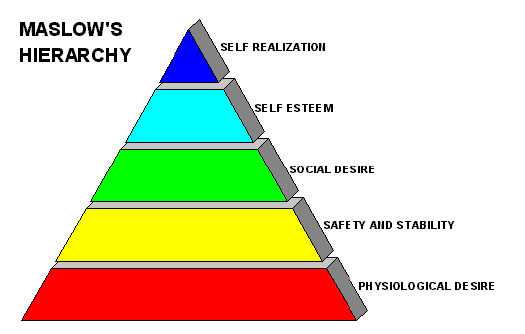I have found myself quoting good old Abraham Maslow a lot these days. Maslow was the psychologist who develop the theory on hierarchy of needs as an explanation of what motivates us.
This has become a helpful tool to try and explain how the world really works to my Millennial students. They seem to assume that the lower level needs are a given. I guess that is the fault of us Boomers who raised them to think that way.
I find myself redirecting our students away from trying to find fulfillment in their careers — if they are lucky that may come so day. Job one right now is, well, to find “job one” coming out of college. They may create it through their business or find one that can meet their basic needs — food, shelter, etc.
James Shewmaker sent along a great blog post from Dr. Paul White’s blog that speaks to this:
I continue to “preach” the concept that a student’s career path is the combination of understanding themselves (their abilities, interests, personality style, etc.) and knowledge about the world of work. And I fully believe that we continually overemphasize the individual aspect of the equation. In fact, (although it is a bit of an over-statement) I have come to believe that it really doesn’t matter what a student wants to do. Ask anyone one of the tens of thousands of individuals who have been laid off, furloughed or who can’t find work.
The issue isn’t “what do I want to do” but “what goods or services are needed that people are willing to pay for”? As a culture, we have forgotten that the primary purpose of a career is to provide financially for ourselves and our family. This is accomplished by providing a service (either customers or an employer) that someone needs and is willing to pay for — and obviously, that we are qualified to provide.
The good news is that my students seem to be catching on. Their plans are getting more realistic and doable, and those who are not pursuing their own ventures are getting much more pragmatic.
What is curious to me is how all of this will impact our entrepreneurial nature of culture in America over the long term. But more on that in a later post….

I have had a great experience this semester with 52 Health Science students, all of whom believe, and have been told, that they will get jobs upon graduation. I, too, find myself referring to the good doctor Maslow, especially after visits from Health Science entrepreneurs who speak about the need for fulfillment. Those visitors have been older, however, and richer, and I reckon the students do not see any urgency in their message..yet. I am winning converts, however, and even the self-described “I’m-not-an-entrepreneur” types acknowledge that they will need to bring something to the party a la Dr. White’s excellent observations.
BTW, here is a funny interview form Conan O’Brian that offers some perspective:
http://www.youtube.com/watch?v=8r1CZTLk-Gk
I did quite the opposite as you. I told them what they will expect to be facing as an entrepreneur, no holds bar. Basically for every 10 that turned up 8 reconsidered their choice of starting a business and only 2 proceeded. No statistics, but out of every 10 that proceeded, only 1 survive after two years – my rough estimate.
It is certainly expected for anyone deciding to venture on the entrepreneurial path, It’s a good Lesson from Maslow, and shall be something to look forward to.